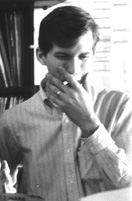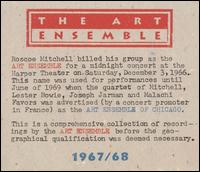

Courtesy of Chuck Nessa

A FIRESIDE
CHAT WITH CHUCK NESSA OF NESSA RECORDS
I like telling stories so here's one for you. I looked around for the
Art Ensemble box set for about four years. On a trip to San Francisco,
I walked into Amoeba and there it was sitting at the front counter. I
think I bought the thing for 75 bucks, best 75 bucks ever spent. Chuck
Nessa has always been a hero to me. Perhaps it's because he is an engima
in the industry (he won't allow others to reissue his material) or perhaps
it's because he has recorded some of the best material on record. One
of my idols, unedited and in his own words.
FRED JUNG: Let's start from the beginning.
CHUCK
NESSA: As a high school kid, I was a rock and roll freak and collected
45s like mad and my father one day came and tossed a Duke Ellington record
down on my bed and said, "Let me hear this once a week." So
I just sort of branched out from there.
FJ: I have listened to plenty of Ellington in my day and never once had
an inclination to start my own label.
CHUCK
NESSA: I don't know. I actually really became impressed with the idea
that somebody made a decision in 1925 or '26 to make this Louis Armstrong
recording that I could hear in my bedroom in the late Fifties. That idea
intrigued me. I figured that there had to be somebody that did that and
I found out about it. That's all.
FJ: Let's talk about the label.
CHUCK
NESSA: I started the label in 1967 after working at Delmark Records for
a year previous to that. I think I borrowed fifteen hundred dollars from
my parents to do my first session or something like that. I just scraped
long the way with what I could save and borrow from friends and what not.
It was a fairly small amount of money. The first one was Lester Bowie
Numbers 1 & 2 (available on CD in a Nessa Art Ensemble box set).
FJ: In 1967, both the Art Ensemble and Bowie hadn't turned the corner,
neither moving to Paris. A lot on the line for your first record.
CHUCK
NESSA: Well, he was a member of Roscoe Mitchell's band and that group
was the first group that I signed to a contract at Delmark. When I stopped
working at Delmark, Roscoe came to me and said that it was time to make
a new record and I said that that was Delmark and it was not me and he
said that I should start my own company and so I did. Since Roscoe was
under contract to Delmark, I did it, recorded the band under Lester's
name. I just had a strong affinity for the music, for that bunch of guys
from the first time that I heard them. It grabbed me, nothing more than
that.
FJ: What did Bob impart to you?
CHUCK
NESSA: How to do record dates. I took a job with Koester to manage the
Jazz Record Mart, to be a store manager and I said I'd take the job if
he let me produce some records so I could learn how to do it and I did.
FJ: Serendipitous that you were living in Chicago and this music was happening
in your front yard.
CHUCK
NESSA: Yeah, sure, absolutely. Understand that Roscoe at that time, he
rehearsed his bands everyday. They didn't work very often, maybe they
had a concert once a month or something. They would also get together
and play sometimes at this lounge at the University of Chicago. So I'd
either hear them at rehearsals or catch them at one of their concerts.
It was fairly sparse. But the AACM was trying to, they would have concert
series whether it would be somebody every Sunday afternoon performing
their music. Joseph (Jarman) had his own group at the time. It might be
Joseph. It might be Muhal (Richard Abrams). There were a number of people
who were striking out as bandleader/composer/players at the time.
FJ: How extensive is the Nessa catalog?
CHUCK
NESSA: I think twenty-seven at this point.
FJ: And how much of that has been reissued on CD?
CHUCK
NESSA: Only about a fourth. It has been purely economics. The way the
record business was at the time, at the time of the switch over from LPs
to CDs, I don't know how to say this. I got stuck with basically thirty
thousand dollars invested in record jackets and nobody wanted to buy records
anymore. For me, it was a huge investment and I never recovered from that.
I don't have independent money that I can pour into it. I'm just able
to scratch out a record when I can.
FJ: There has been a resurgence of vinyl. Has anyone made an effort to
contact you about distributing Nessa LPs?
CHUCK
NESSA: No, no, I mean, there has been some sniffing around the edges,
but nothing worth doing.
FJ: Any interest in purchasing the catalog, lock, stock and barrel?
CHUCK
NESSA: Sure, Fred, but it is mine. I don't want to sell it. It means too
much to me.
FJ: You are an enigma wrapped in a riddle to hold fast to your life's
work rather than fiscal gain.
CHUCK
NESSA: Sure, absolutely. There wouldn't be a situation where I would allow
anyone else to do it. That will happen after I die. I'll just hang onto
it otherwise. Understand, Fred, that all of this stuff in its original
format are in multi-track tapes that need a fair amount of restoration
work. I don't just simply take the LP tapes and put out a CD. That can
be done fairly economically. I go spend hours and hours and hours remixing
and repairing tapes in the studio to get a CD master ready so that it
sounds good. I could do it fast and cheap. I just won't work that way.
FJ: What titles are available on CD?
CHUCK
NESSA: There's the Fred Anderson (Missing Link), Air, Air Time, the five
CD set by the Art Ensemble. It is some great stuff. Also, that is the
stuff that I've manufactured here. I've also, a company in England called
Chief wanted to license some of my stuff and the guy who owns it is a
friend of mine and he wanted to license it for England only and I prepared
the tapes and stuff and sent it to him and he put it out over there and
he wasn't very successful with it and so I winded up buying his inventory
back from him and selling those titles. There's Roscoe Mitchell, L-R-G/The
Maze/S II Examples disc. One of the Von Freemans. Hal Russell NRG Ensemble
(Generation) and Wadada Leo Smith's Spirit of the Great Ancestry, they
are available that way. I do a fair amount carried by North Country, Cadence
Magazine, for people who buy from there and also, Mosaic Records carries
them. Okka Disk carries them on their website.
FJ: Any plans to reissue the remainder of the catalog?
CHUCK
NESSA: Sure, I'm planning on going in the studio this summer and working
on some things and accumulating a little bit of money so I can do that.
FJ: Are the LPs readily available?
CHUCK
NESSA: Most of them are not. I have five titles still available. One of
my Bobby Bradfords, the first Wadada Leo Smith record called Spirit Catcher,
and my Eddie Johnson record and Hal Russell and Mars Williams record.
FJ: How intensive is your involvement in the scene now?
CHUCK
NESSA: The last show I went to was two weeks ago, maybe it was three weeks
ago now, when I went to see Roscoe and Fred together. It was a really
nice concert.
FJ: All things being equal, who would you like to get into the studio?
CHUCK
NESSA: Well, first of all, I tend to record people that aren't being recorded
at the time, what I feel is really important and that somebody really
needs to be recorded right now. Of course, I have a very close affinity
with Roscoe and there are probably three or four projects I can think
of that I would do with him if I could afford it. Henry Threadgill would
be high on my list, but he's just had two recent discs (both on Pi who
has also released a Mitchell record as well) and the thing with Leo Smith,
he's being recorded somewhat now and he's somebody that I feel very close
to and would work with.
FJ: What are the costs to put out a record?
CHUCK
NESSA: Oh, it varies all over the place. If you're going to properly pay
musicians. There are just so many variables, the complexity of the artwork,
probably, a good starting place for a cheap CD would be twenty-five thousand
dollars.
FJ: Any regrets?
CHUCK
NESSA: Yeah, sure, there are always regrets. I regret that I wasn't able
to record Joseph Jarman in the Sixties. I would have liked to have done
a lot of Sixties and Seventies early on. I felt close to him and his music,
but I just didn't have the funds to do that. I had to focus on what I
chose to focus on and I chose to focus on Roscoe and that was to some
extent at Joseph's expense. I wish I had recorded Warne Marsh again and
I also regret that I got caught in the position I did, sort of caught
with my pants down when the CD hit. Sure, there are regrets, but I don't
think that there is anything that I did that I would undo. All the things
are regrets that I wasn't able to do.
Fred Jung is the Editor-In-Chief and it's in the game. Comments? Email Him